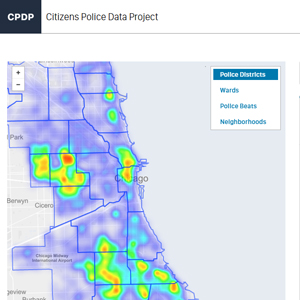Journalism production company wins grant to expand police misconduct database

A screenshot of the Citizens Police Data Project website.
The country’s largest database of police misconduct allegations might get even bigger, thanks to a grant from the John S. and James L. Knight Foundation.
The Invisible Institute, a journalism production company, won $400,000 toward continuing to build its database, its press release said Tuesday. The database, called the Citizens Police Data Project, tracks misconduct allegations against Chicago police officers. The grant came as part of the Knight Foundation’s News Challenge on Data, which was intended to fund new ideas in news and information.
Launched in November, the Citizens Police Data Project contains more than 56,000 complaints against police officers. According to the Invisible Institute press release, it’s already shown that fewer than 3 percent of allegations lead to disciplinary action, and that African-Americans’ complaints are sustained in disproportionately low numbers.
The database also played a role in the high-profile Chicago protests of the shooting of Laquan McDonald. After police released dashboard camera footage of the shooting, the database was able to provide background on complaints against the shooting officer, Jason Van Dyke. These included allegations of alleged force and racial slurs.
Such databases are also useful to criminal defense lawyers, as the ABA Journal reported this month. The Legal Aid Society of New York City was keeping such information on paper before 1998, the article notes, and is now keeping it in a database called the Cop Accountability Project.
With the award money, the Invisible Institute plans to add tools allowing users to examine the data according to geography, race, gender and socioeconomic status. It also plans to add a Web-based application that simplifies filing and tracking police reports, thus making it easier to hold officers accountable.
The Invisible Institute was founded by Jamie Kalven, who won a 2014 decision on police records from the Illinois Court of Appeals. The court said records of allegations against police officers are public information discoverable through freedom of information requests. The litigation was important to the development of the Citizens Police Data Project.



